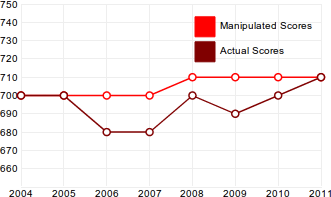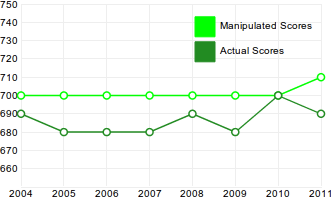Did a Top Liberal Arts College Falsify SAT Data to Legitimize Racial Preferences?
Charles C. Johnson, Big Government, February 1, 2012
Claremont McKenna College, a private liberal arts college in Los Angeles, has earned international infamy for fraudulently misreporting its SAT scores to game the U.S. News & World Report rankings. Richard Vos, dean of admissions since 1987, resigned in disgrace Monday, starting a nationwide debate about the role of SATs in higher education and the integrity of Claremont’s admission process. But absent from any analysis is this: Vos began falsifying SAT scores in 2005, right around the time Claremont began to institutionalize racial preferences. An investigation of the data since released suggests that Claremont manipulated the school’s scores to cover up admittance of under-qualified minority students.
Every spring, Claremont reports SAT scores from the preceding fall entering class to U.S. News & World Report. For the class admitted in 2004, its scores and data are sent in March 2005 and published in the fall issue.
The timing is relevant here because, in 2004, Claremont began admitting its first of four classes from the Posse Foundation, a full-scholarship program for inner-city students from Los Angeles. Ten students were admitted per year into a class of about 250 students, for a total of 40 students over four years. The students were personally interviewed by Vos and Gann, according to a press release from the college’s website in late December 2003, but in his 2005 report to U.S. News — the first year Posse students were admitted — Vos began falsifying SAT scores. The actual and manipulated mean SAT verbal and math scores are below; the median are accessible here.
In 2007, Claremont began admitting students from QuestBridge, another scholarship program for students from poor and largely minority backgrounds. {snip}
Although we do not know the statistics for the Posse students, we do have reason to doubt their academic qualifications as a group. At least one student flunked out and several took leaves of absence for academic reasons. A 1998 evaluation of the Posse program at Vanderbilt University found that athletes entered with an average of 1042 SAT score and maintained an average GPA of 3.13, while Posse students came in with a 900 average SAT and finished with a 2.93 average GPA. Due to the low grades of Posse students in their engineering programs, Rice and Lehigh canceled their involvement with Posse, according to the L.A. Times in 2004.
At Claremont, the class of 2011, admitted in 2007, is the only class admitted in its history to have members of both QuestBridge and Posse in its ranks. It was also the class that saw its mean math scores inflated the most — by 28 points.
{snip} In 2008, Claremont canceled its involvement with Posse for unstated reasons; in 2009 it canceled its involvement with QuestBridge for “financial considerations,” Vos told me via email on December 31, 2008.
The charts indicate that the scores for Claremont’s verbal and math SAT scores rose after 2009 — the first year no Questbridge/Posse students were admitted.
{snip}
Ever since Gann came to Claremont from Duke Law in 1999, she has stressed diversity. In 2004, she defended Kerri Dunn, a visiting psychology professor who faked a hate crime against herself and her car (Dunn was imprisoned for insurance fraud).
That incident got national attention. Gann pledged an independent investigation, though none took place. After Dunn’s hoax and the racial animus it stirred up, she bemoaned the low numbers of black undergraduates (then 4% of 1,052 students) and minority tenure-track professors to the St. Petersburg Times in 2004 and promised to fix the numbers.
There have always been grounds to challenge the college’s affirmative action policy. The Claremont Independent, the college’s conservative newspaper that I once edited, first reported that the college had been discriminating on racial lines in November 2006. “Statistics provided by the admissions office show that it admitted roughly 45% of both black and Hispanic applicants, vs. 22% of the white applicants and 17% of Asian applicants,” we wrote. Vos denied that such a racial agenda exists, but in 1999, Vos criticized the anti-racial preference Proposition 209 ballot measured passed by California voters. “Why would we change our policies?” he rhetorically asked when questioned whether Claremont would also be racially neutral. “We’ve always had a commitment to affirmative action, and now because some students perceive that the University of California system is perhaps not as welcoming as it was a few years ago, more students are now thinking of going to the private [colleges]. The UC’s loss is our gain.” {snip}
{snip}

















